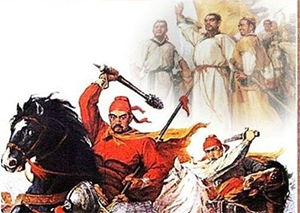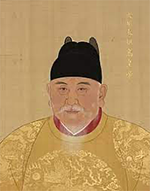China's Hongwu Emperor: Founder of the Ming Dynasty
The Hongwu Emperor began the Ming Dynasty in 1368, toppling the foreign import Yuan Dynasty in the process. For nearly 300 years, Ming emperors oversaw a vast expansion in Chinese population, prestige, and influence. He was born Zhu Yuanzhang in 1328 into a peasant family. Working hard as a youngster prepared him for a life without the rest of his family–the result of a drought and a consequent famine. He endured by joining a Buddhist monastery and there discovered the separatist White Lotus movement and its offshoot the Red Turbans, which he joined, excelled in, and eventually controlled. His stays in Buddhist monasteries numbered two, as the first one that he joined had to close because of a lack of money to support it. After another few years of living off the land, he joined another monastery and there found solace and support. At age 24, he joined an armed force bent on rebelling against the Mongol rulers and was soon in charge of his own army. That army succeeded in 1356 in taking control of Nanjing, a city important both geographically and symbolically. 
The Red Turbans had a common enemy–their Mongol overlords–but not a consistently coherent strategy. Various factions around the empire had their own armies, with their own leaders, and those leaders inevitably quarreled with one another. Zhu emerged triumphant out of that internecine struggle, punctuated by his triumph over the much larger army commanded by Chen Youliang. That three-day battle, at Lake Poyang in 1363, is thought to be one of the largest naval battles in history. Zhu's final victory was over Zhang Shicheng and gave the victor control over the former Song Dynasty capital, Hangzhou. Seeing that, the remaining Red Turban warlords submitted to Zhu's authority; and on Jan. 20, 1368, he proclaimed the Ming Dynasty. The seizure and razing of Beijing put an exclamation point on this declaration. Having won the battles, he still needed to win the war because although Zhu was the supreme master of the Red Turbans, the rebellion had yet to overthrow their target. Zhu's army marched north and forced a recalcitrant Yuan army to retreat into Mongolia. The tables turned, now-rebel Yuan forces fought on, until in 1381 Zhu's armies succeeded in taking Yunnan and, with it, all territory once controlled by Kublai Khan and his successors. 
The first emperor of the Ming Dynasty set about shoring up his reign and his empire, ensuring competent government bureaucracy by continuing the Confucius-based civil service examinations that the Yuan rulers had restored. In a stark contrast to Kublai Khan's embracing of Chinese styles and traditions, the Hongwu Emperor, also named Taizu, banned Mongol clothing and names. As an extension of this, the emperor severely discouraged international trade, seeing it as a threat to Chinese ideals. Remembering his peasant heritage, Taizu instituted public works projects (including a major restoration of the Great Wall) and land reforms that favored people with little income or prospects. The emperor also mandated that soldiers be given land for growing crops. A greatly reformed legal code helped reinforce these edicts while also giving greater recognition and protection to, in particular, slaves. Another subset of the population that enjoyed greater favor with this emperor than perhaps under previous rulers was those who professed to the Muslim faith. Taizu himself gave permission for a number of high-profile mosques to be constructed in a handful of provinces and also removed any prohibition against Muslims serving in his army. In another stark reminder of who had defeated whom, Taizu ordered retribution against people living in provinces that did not support the Red Turban Rebellion. As his reign progressed, Taizu also became extremely worried about being assassinated and extremely suspicious of nearly everyone around him. He ordered the executions of many thousands of people whom he suspected of plotting against him. The new legal code also included a wide variety of ways that such people were executed. Taizu much preferred to avoid getting involved in foreign conflicts and, unlike some of his predecessors, refused to take sides in an ongoing dispute in neighboring (what now is) Vietnam. At the same time, Taizu was more than willing to defend his coasts from Japanese raiders. This did not mean, however, that the emperor reduced the size of the army. He was not entirely trusting that another Mongol invasion wasn't on the horizon. When Taizu died, in 1398, he had been emperor for three decades and had presided over a period of growing prosperity and prestige. Taizu mandated that his successor be Zhu Yunwen, the oldest surviving son of Taizu's oldest son, Zhu Biao, who had died in 1392. Zhu Yunwen became the Jianwen Emperor.
|
|
Social Studies for Kids
copyright 2002–2025
David White




